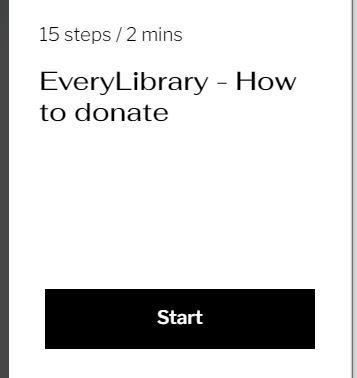School Librarian Martha Hickson Helps Develop Website for Librarians Facing Book Challenges
Demo Defense uses a web tutorial to walk librarians through reporting challenges and finding support, as well as to help the public donate to the organizations fighting against censorship.
NJ high school librarian Martha Hickson shared her story of fighting back against a book challenge to help other librarians. Now, she has helped develop a website with the same purpose.
 A collaboration with web tutorial creator iorad, Demo Defense walks librarians through what to do when they face a challenge and assists the public on ways they can help.
A collaboration with web tutorial creator iorad, Demo Defense walks librarians through what to do when they face a challenge and assists the public on ways they can help.
For Hickson, the Demo Defense project has three goals: Make it easier for librarians to report a challenge to multiple organizations; raise awareness of censorship and book banning attempts; and to help raise money for the organizations that supported her, including EveryLibrary.
The iorad web tool allows users to create tutorials that can get superimposed on any web browser. On Demo Defense, the tool outlines reporting challenges to each organization, and it also allows the public to assist the cause.
“One of the things we know about challenges is that they're underreported,” commented says Hickson.
People are afraid to report challenges, Hickson says, or they don’t know where or how to report them. Demo Defense details the process step-by-step—which organizations to contact and how to navigate to report a challenge within those websites. And makes it easy to report to more than just one, including the ALA Office for Intellectual Freedom, EveryLibrary, PEN America, the National Coalition Against Censorship, and the Comic Book Legal Defense Fund.
The Demo Defense collaboration came about after iorad’s chief happiness officer Dipti Patel read about Hickson and asked Arlen Kimmelman, iorad’s director of public engagement, if they could help. It just so happens that Kimmelman is a former NJ school librarian. She reached out to Hickson and asked what the company and its web tool could do. Hickson immediately had ideas. She had already been using it for lessons that frequently require repeated instructions or reminders, such as how to navigate a database.
“I thought that a great use of iorad is showing people where to go and what to do once they get there,” says Hickson. “The other thing is a lot of people have asked me over the last year, ‘How can I help?’ One big thing they can do to help is to help the organizations that helped me, the organizations that support the First Amendment and the right to read. Those organizations need money.”


Demo Defense also shows users how to donate, another important function to Hickson.
“What EveryLibrary did was nothing short of heroic,” she says. “[Executive director] John Chrastka was by my side, a phone call away for eight weeks, pro bono.”
For Kimmelman, it was a chance to give back to her former profession and the organizations that once helped her, as well. When she was a librarian at Clearview Regional High School in Mullica Hill, NJ, she faced a challenge, too. At first, she struggled with where to get help.
“Everybody thinks locally, who can help me locally?" she says. "But when I finally got a hold of ALA, they walked me through every single step."
She ended up with a binder of information, she says, that was so thorough, she fought back against the challenge and the book remained on the shelf. With Demo Defense, users have all of the resources in one place, says Kimmelman. Just as important as documenting the process to report the challenge, it shows there is support.
“If somebody's having a problem, they don't feel alone,” says Kimmelman.
When reporting a challenge online, most of the organizations’ websites offer to contact the librarian reporting the challenge to offer further assistance, she says.
“It's just such a relief to know that these [organizations] are there backing you up.”
RELATED
The job outlook in 2030: Librarians will be in demand
The job outlook in 2030: Librarians will be in demand
ALREADY A SUBSCRIBER? LOG IN
We are currently offering this content for free. Sign up now to activate your personal profile, where you can save articles for future viewing





Add Comment :-
Be the first reader to comment.
Comment Policy:
Comment should not be empty !!!